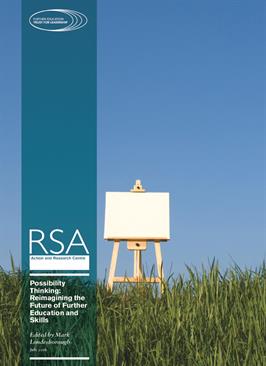Successive waves of change in further education and skills have developed the sector's adaptability, but stopped it from driving its own self-improvement. The sector needs a dose of ‘possibility thinking’ if it is to take full advantage of the opportunities that await. A new report from FETL and RSA recommends that the FE & skills sector must be an ‘agitator for change’ in each and every community if it is to take full advantage of the opportunities that await.
The FE and skills sector is once again in the midst of fundamental change, to a new era of devolved skills policy, college mergers and rapid apprenticeship growth. To take full advantage of this moment, the sector needs a shift in self-concept; imaginative, assertive and creative leadership and an optimistic outlook - imagining new possibilities, both for its role within communities and in its own self-improvement. The recent referendum has revealed the extent to which many people in the UK feel otherwise disenfranchised and excluded from the benefits of economic growth. In its wake, the need for the sector to develop its role in sustaining cohesive and thriving communities has been made even more urgent.
Possibility Thinking is a new collection of essays published by the RSA in collaboration with the Further Education Trust for Leadership (FETL). It focuses on three interconnected and overlapping areas of change that will enhance the FE and skills sector’s potential to develop the creative capacities of learners and their communities:
- The removal of policy barriers to innovation at institutional, (sub-)regional and system levels. Devolution deals open the possibility for local areas to test out different models, but they are held back by lingering centralising tendencies in government. The apprenticeship levy is an example of how a mechanism with the potential to support employer and provider innovation in delivering outcomes for learners and localities, will likely be undermined by the need to meet the arbitrary national target of 3m apprenticeship starts.
- Greater appreciation of the sector's connection to and integration with place and its potential to liberate the creative potential of localities through regeneration, training for meaningful work and partnerships for local economic growth. Local skills systems need to develop as anchor institutions connecting communities to place. In so doing it will be helping to heal some of the social divides that have become more apparent and divisive in recent times.
- Increased support for a cadre of creative leaders who see their role as leaders of communities as well as institutions, driving a new sectoral self-concept and public understanding built on innovation, in particular in pedagogy and partnership working. This renewed emphasis on leadership should be truly systematised, with the development of tutors’ own capacities for innovation at its heart.
Each of the 8 essays in this collection responds to a different ‘what if’ question, with authors being invited to respond with deliberate idealism about the future possibilities. We have focused on what the sector can do for itself, mindful of the current policy context, and identifying ways that policy might enable, rather than constrain, sectoral innovation and public value. Authors have been chosen to represent a range of perspectives from within and outside FE and skills:
Philippa Cordingley is the Chief Executive of the Centre for the Use of Research and Evidence in Education (CUREE).
Paul Crisp is the Managing Director of CUREE and its Chief Information Officer (CIO).
Pauline Tambling CBE is Chief Executive of Creative and Cultural Skills.
Bill Lucas is Professor of Learning at the University of Winchester and Director of the Centre for Real-World Learning.
Rowan Conway is the Director of Development at the RSA.
Oliver Broadbent is Director at Think Up.
Sir Michael Barber is Pearson’s Chief Education Advisor.
Anthony Painter is Director of the RSA’s Action and Research Centre.
Charlotte Alldritt is Director of Public Services and Communities at the RSA.
Paul Little is Principal and Chief Executive of City of Glasgow College.
The publication is edited by Mark Londesborough, Programme Manager – Creative Learning and Development, with foreword by Dame Ruth Silver and afterword by Martin Doel.
Download 'Possibility Thinking' (PDF, 1.4MB)
Update, March 2017
The Further Education Trust for Leadership (FETL) has launched a major new report as a follow on to last year’s collaboration with the RSA.
The follow-up report, Possibility thinking: Creative conversations on the future of FE and skills, is a selection of the essays published as part the first phase of the project and features two new essays on subjects early readers felt were neglected in the original publication – the role of independent training providers and the role of governance. It also includes thoughtful responses from people within the sector to the ideas contained in all the essays. Crucially, it aims to provide a critical space in which these ideas can be further explored in written conversation and taken forward within the FE and skills sector.
pdf 1.4 MB
